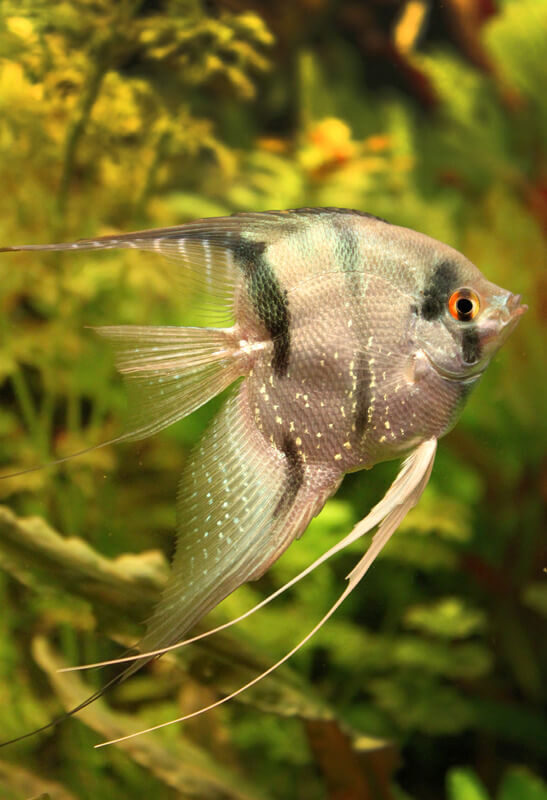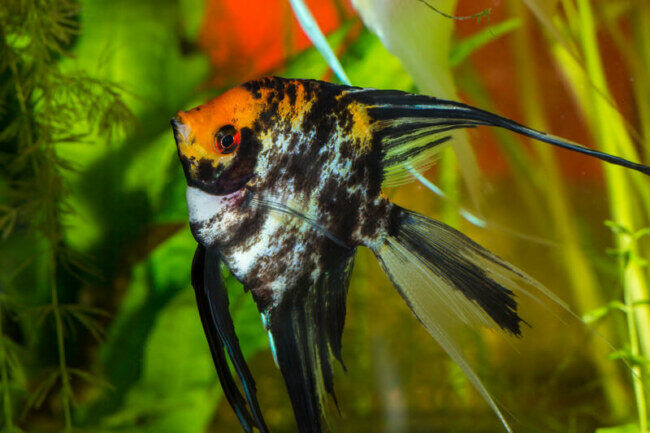 Angelfish are spectacular-looking fish that you can keep in your aquarium. But, I was wondering whether the Angelfish jump out of their tanks or not. So, I decided to do some research and found some interesting information.
Angelfish are spectacular-looking fish that you can keep in your aquarium. But, I was wondering whether the Angelfish jump out of their tanks or not. So, I decided to do some research and found some interesting information.
Do angelfish jump out of tanks? Angelfish can jump out of their tanks. However, it’s quite uncommon. In most cases, they stay in the tank if they are healthy and happy. But if the tank water gets dirty or too toxic with ammonia and nitrate, or if they feel any danger, they might jump out.
There are several more crucial reasons for your Angelfish to jump out. If you have ever faced any similar situation or decided to get an Angelfish as your pet, you should probably know these reasons to avoid any mishaps in the future.
What are the Reasons for Angelfish to Jump out of Their Tanks?
Basically, there are a lot of reasons why an Angelfish might jump out. These include lack of oxygen, unstable temperature, lack of hiding places, fear factors, bullying or fighting, and toxic water.
1. Toxic or Dirty Water
Angelfish are quite sensitive when it comes to the water quality of the aquarium. They might jump out if there’s a higher level of nitrites, ammonia, and nitrates in the water.
In simple terms, if the water condition of your tank is not ideal, then your precious Angelfish may attempt to leave the tank to search for a better one.
Ammonia and nitrites are really harmful, and even a small percentage can make the fish sick and kill them. High nitrate levels are also harmful to your Angelfish and can cause them distress.
2. Lack of Oxygen
Another reason for your Angelfish to jump out can be the lack of dissolved oxygen in the aquarium water. While most of the fishes don’t have lungs to breathe oxygen directly from the air, they need dissolved oxygen in the water for breathing properly.
If your Angelfish can’t breathe oxygen, it may try to jump out in the hope of finding a suitable place with more dissolved oxygen in the water.
That being said, a tank with not enough oxygen and too many fish would only cause your fish to fight for a chance to breathe. Another problem is algae. These tend to use up a lot of dissolved oxygen with very little to spare for the fish.
3. Unstable Temperature
Angelfish need a certain temperature to survive, just like any other fish. They are also quite sensitive to water temperature changes. If the water is too hot or too cold for your Angelfish, it may prompt your fish to jump out.
4. Fear Factors
It mostly happens to new fishes in the tank. It takes some time for a new fish to adjust to the changing environment. That’s why your Angelfish may freak out in the early phases.
Sudden flashes of light or bright lights can also startle your fish. Any new or sudden changes such as your shadow may frighten your fish and cause it to jump out. Also, if your aquarium doesn’t have any lighting fixtures, turning on the light of your room could scare your Angelfish.
5. Lack of Hiding Places
This is a very rare reason and much harder to prove, but still may cause your Angel to jump out. If you have too many fish living in a small tank, it won’t be sufficient for them.
According to the rule of thumb, one Angelfish needs at least 10-gallons of water in the tank. If not, they will feel cramped and may feel the need to escape to a better environment.
Most importantly, if your fish don’t get along, then they may need a place to hide from any large or aggressive fish.
The lack of hiding spots, like caves or plants, can cause the threatened Angelfish to make a break for it.
6. Bullying or Fighting
Well, let’s face it, even if you offer the best living conditions for your Angelfish, there’s bound to be some form of internal competition. Angelfish aren’t typically aggressive. However, they can show aggression under certain conditions.
Angelfish are extremely territorial and even get in fights with other species of fish to claim their territories.
If your Angelfish keeps fighting, it can turn into a mess faster than you expect. Fighting or bullying may leave the losing fish no choice but to jump out of the tank to escape the situation.
We have created a couple of articles that will help you with such issues. Read them here:
How can You Prevent Your Angelfish from Jumping out of the Tank?
Keep the Water Clean
Angelfish are a bit aggressive eater and can produce a lot of waste. All the decaying fish waste, plants, uneaten food, and dead fish can increase the ammonia levels drastically.
That’s why you have to maintain the recommended level of ammonia, nitrite, and nitrate to keep your fish safe. The ideal level of ammonia or nitrite is zero. Also, the level of nitrate should be between 5-10 ppm. Anything more than this is too dangerous for your Angelfish.
You should also change the water regularly, but don’t go overboard with it.
Changing the water too often can make your Angelfish aggressive as they mark their territory with their waste. You should change the water 20-25% bi-weekly to keep the water clean and your Angelfish healthy.
Cover Up the Tank
Covering up the tank is a great way to prevent your Angelfish from jumping. A simple solution for this problem is to buy a hood that fits your tank.
If you have any kind of lighting system, then a screen or mesh lid would be perfect for it. It will keep your Angel from jumping out and also allow light to pass through. Another great option is to get plexiglass as the cover for your tank.
Use Floating Aquarium Plants
You can use floating aquarium plants in your tank to prevent your Angelfish from jumping. Floating plants are perfect natural shades for your tank. It gives the fish a sense of being closer to nature, and they tend not to jump when there’s a plant hovering above them.
They will add a stunning visual style to your fish tank, as well.
It’s a great method of adding oxygen as these plants act as an air circulation system. This will give your tank additional oxygen and benefit your Angels in the long run. These also filter out toxins in the water.
Floating plants like Duckweed or Amazon Frogbit are great for Angelfish. Duckweed happens to have a reputation for getting rid of algae, as well.
Avoid Overcrowding
Try to have less fish in the tank to avoid overcrowding. You can also get a bigger tank for your fish. The best solution is to pair your Angelfish with less aggressive breeds, like, Corydoras Catfish, Bolivian rams, Platies, etc.
A good tank mate would mean less bullying or fighting. Also, make sure to add enough hiding spaces for your fish, like, plants and caves.
Maintain Proper Temperature and Oxygen Levels
As I said before, the temperature is crucial for Angelfish. You should always maintain the correct temperature to keep your Angel happy.
An ideal temperature would be 76-82 °F (24.44-27.8°C). But it would vary based on whether you intend breeding or not. Temperatures from 76-78 °F are sufficient for a non-breeding Angelfish as it slows down the growth.
But, for a breeding Angelfish, a temperature of 80 °F is ideal.
You also have to maintain the oxygen level properly so that your fish can get plenty of oxygen for breathing. Adding up air stones can increase the level of dissolved oxygen in the water.
What Should You Do If Your Angelfish Jumped Out?
Well, as soon as you detect your fish, quickly check if it’s alive or not. If it’s alive, immediately put it back in the tank. Your fish should be fine in case you immediately spotted it after the jump. However, if it’s been a while, it’s hard to say whether your Angel will make it or not.
You need to transfer it to a clean hospital tank and not give it any more stress. You should give it time to recover and observe how it’s doing.
In the meantime, inspect your aquarium to see what the issue was that caused your Angelfish to make a break for it in the first place.
If there are no detectable problems, it’s best to get a lid for your tank before you transfer your Angelfish into the main tank.
Next, check your Angelfish if it has any wounds or not. If your fish made the jump after a fight, it might have wounds, and you need to treat them. You may use an all-natural anti-bacterial treatment to help your Angel heal faster.
Another great option would be to increase the temperature a little bit. A higher temperature can make their immune system strong and helps them fight off any infections from the wound.